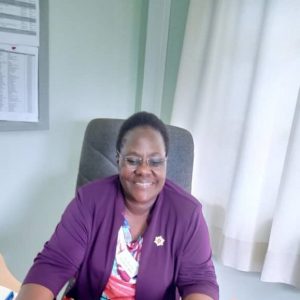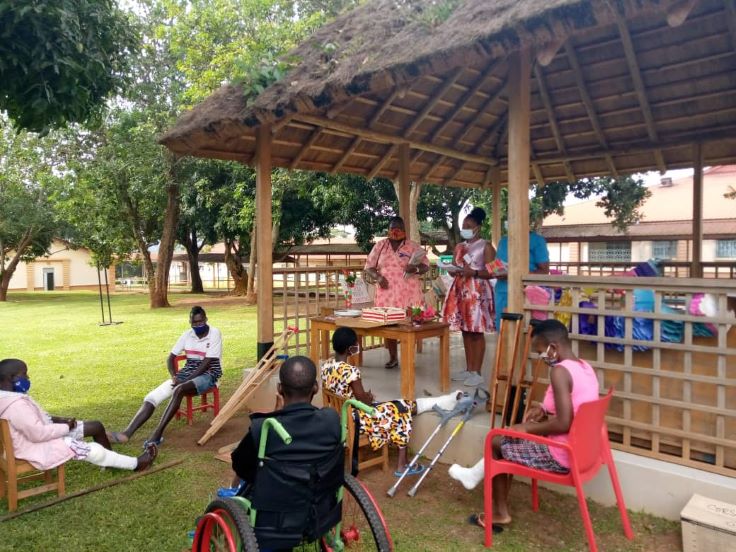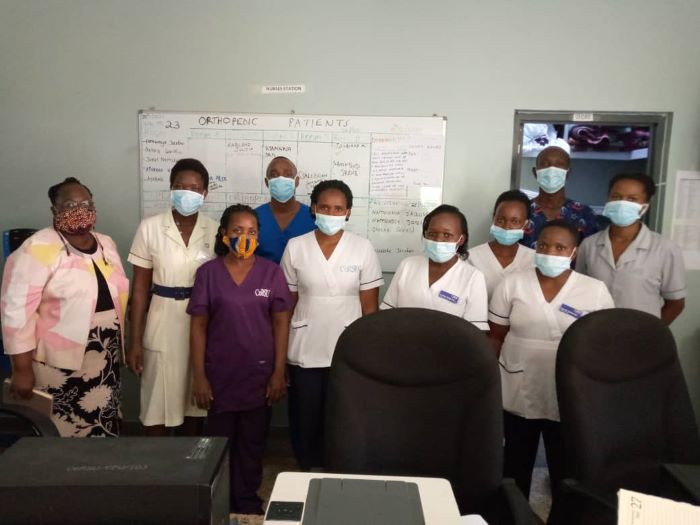Uganda’s Champions Leading the Fight against Antimicrobial Resistance: Dr. Birabwa-Male
Marion Murungi, Senior Technical Advisor, USAID MTaPS, interviews Dr. Doreen Birabwa-Male, Medical Director and Deputy CEO of CoRSU Rehabilitation Hospital and a Champion of AMR

Can you tell us about your professional journey as a leader in the field of AMR in Uganda?
I previously worked for nine years as the Executive Director of Mulago National Referral Hospital, the biggest hospital in Uganda. I worked there [Mulago] longer as a Senior Consultant Pediatric Surgeon. I was also the chairperson of surgical services and chairperson of the infection control committee, which allowed me to engage comprehensively with infection prevention and control (IPC) and antimicrobial resistance (AMR) issues.
Having worked extensively on these components, I became quite passionate about IPC and AMR containment.
What has been your experience implementing IPC and antimicrobial stewardship (AMS) interventions in the clinical setting in light of the growing AMR crisis?
Through extensive travel and observing what happens in other countries, I have gathered that by and large, health workers tend to feel too busy to observe certain things. But infection control must be part of our daily work, not only for surgeons but all health professionals. We only emphasize surgery because there are interventions that predispose patients to infections at the hospital.
The biggest challenge we must address at this time is attitude. In many countries, the systems and processes are in place, but practitioners sometimes choose to do something else. That choice is what makes all the difference. We must change our attitude towards patient management and focus on improved quality of service delivery. When we practice IPC, we reduce health care-acquired Infections (HAIs) and improve health service delivery in hospitals.
Hospitals in Uganda often face patient overflow, lack of running water, and even sewage leakage. But even in those challenging conditions, when you observe IPC, you get it right.
It has been a very long journey, but we made progress. We got buy-in from the Ministry of Health and the hospital IPC committee, and the medicine and therapeutics committees are in place. The Ministry supports training and logistics through warehouses to factor in IPC and AMS toward improving the quality of health service delivery. We are also teaming up with NGOs and other interested partners to acquire knowledge and skills in this area.

Dr. Birabwa-Male with patients at CoRSU Rehabilitation Hospital
Do you feel that there is enough support from the Ministry of Health to further this cause?
There are gaps, but the fact that they acknowledge the value of containing AMR is a good start. The Ministry of Health has a lot on their plate, and for them to prioritize an issue, you need to work hard. That we have been able to get a desk on AMR at the Ministry and get pharmacists at the Ministry to spearhead this intervention shows a level of progress.
USAID MTaPS is supporting Uganda’s fight against AMR through the global framework of WHO’s Joint External Evaluation to strengthen capacities for IPC, AMS, and multisectoral coordination. How do you see this advancing Uganda’s goal to defeat AMR?
It is excellent that USAID is supporting this focus on AMR. Previously, some partners did so but not as a priority. I think it is a unique approach that will have good outcomes. An element that the interventions could incorporate is changing people’s attitudes to realize that this is not additional work but is part of their responsibility as health care workers. AMR social and behavioral change communication can be done with the support of experts.
I commend USAID MTaPS’ efforts, including training health care workers, equipping them with the skills to conduct baseline IPC and AMS surveys at their facilities to appropriately tailor interventions and address identified challenges, contextualizing to their settings. The support will enable us to realize significant improvements in containing AMR.
That said, the One Health approach is fantastic, but it is an uphill task. Veterinary medicine being more focused on profit-making, a sustained effort is necessary to secure their buy-in. Interventions in human medicine to contain AMR can give some quick wins.
How do you see the role for women in strengthening IPC and AMS at health facilities? What’s your advice to them on how to become AMR champions and leaders in their settings?
Some may say that I am biased as a woman, but my experience tells me that women are going to get on board with this and take it to the next level. So, USAID and MTaPS would do very well to invest in women. Additionally, a recent gender assessment in the health sector found more women than men in the health services countrywide. Therefore, women are well-positioned to become AMR champions.
What are your recommendations for fellow leaders and professionals in the fight against AMR?
My recommendation is that we must fight HAIs, and we must fight AMR. Continuous learning can help us achieve this. Whenever there is an opportunity to learn, get involved so that you can learn and pass on the knowledge to other people so that together, we can form a critical mass that will fight HAIs and reduce and prevent AMR in Uganda and the world.

Dr. Birabwa-Male with her team at CoRSU
Any recommendations to policymakers and national and local government leaders?
We, the champions, know that IPC and reducing and preventing AMR are the backbone of good health service delivery. We need to acknowledge that if we did not have a strong IPC system in Uganda, we would never have been able to fight COVID-19.
My recommendation is to request that the Ministry of Health prioritize and address IPC and prevention of AMR by giving all the necessary support, especially training in AMS. There is a need for specialists in this area that are duly facilitated and recognized to take this mandate forward.